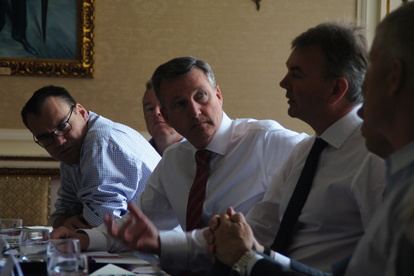Facilitator: Ben Wright Expert: Barry Waring
Headlines:
- People’s expectations of what work looks like has changed due to the pandemic and it’s not going to go back to how it was before
- Employers need to embrace the new world in their policies
- True flexibility is now a requisite to attract good staff
Discussion Points:
Most employers promote “flexibility” through hybrid working, however also require all staff to attend the office a certain number of days. There was one example of time logging being required for staff working from home but not for those working in the office.
Some staff wanted to work from the office for their own wellbeing, which needed to be supported. Ultimately, this comes back to providing the environment that person will work best in, allowing them to thrive whatever their own personal circumstances.
Remote workers lose the casual interactions of the office, which can lead to them not understanding or embracing the culture of the workplace. It can also lead to loneliness, which appears to be on the rise.
Creating time to talk (non-work based) was something all participants had tried to different extents with events like “tea Tuesdays” and “wine Wednesdays”. Walking meetings were also encouraged to help with physical health.
We talked about removing holiday allowance but leaders choosing not to take any holiday would set the expectation for staff that it’s not appropriate to take holiday. Businesses where leaders who took holiday, and shouted about it, seemed to have a better culture. The same point was made about employees feeling they were expected to work long hours or indeed work from home whilst ill and how it was the behaviours of the leadership in the business which encouraged bad behaviour.
How the business handles these micro-moments tells others about the business’s values, beliefs, and culture. A bad on-boarding or off-boarding experience will be talked about, sending ripples out amongst other staff leading them to form an opinion of their employer’s values, which in turn affects how they act in day-to-day work. All firms embraced the idea of flexible working; however, it was obvious that some businesses were more set up for it than others.
Whilst most operated “hybrid working”, this invariably involved requiring employees to be in the office a certain number of days, and sometimes specific days. Whilst this is hybrid working, it isn’t flexible working and more needs to be done to educate employers on this.
Two participants said that the office needed to be always staffed to answer phones, receive post, etc, but as long as that was done, staff could choose to work from home. This is an example of workplaces not being set up to operate in the post-pandemic world. Changes to virtual phone systems, scanned post services, etc would transform the need to have staff in the office at all and would improve available flexibility.
Key Takeaways:
- Leaders must visibly demonstrate the behaviour that they want their staff to exhibit
- It’s important to create a clear culture for employees to belong to, especially remote workers
- True flexibility for employees, based on their individual circumstances, is now expected”
- The experience that one employee has when they join or leave a business affects the whole business


